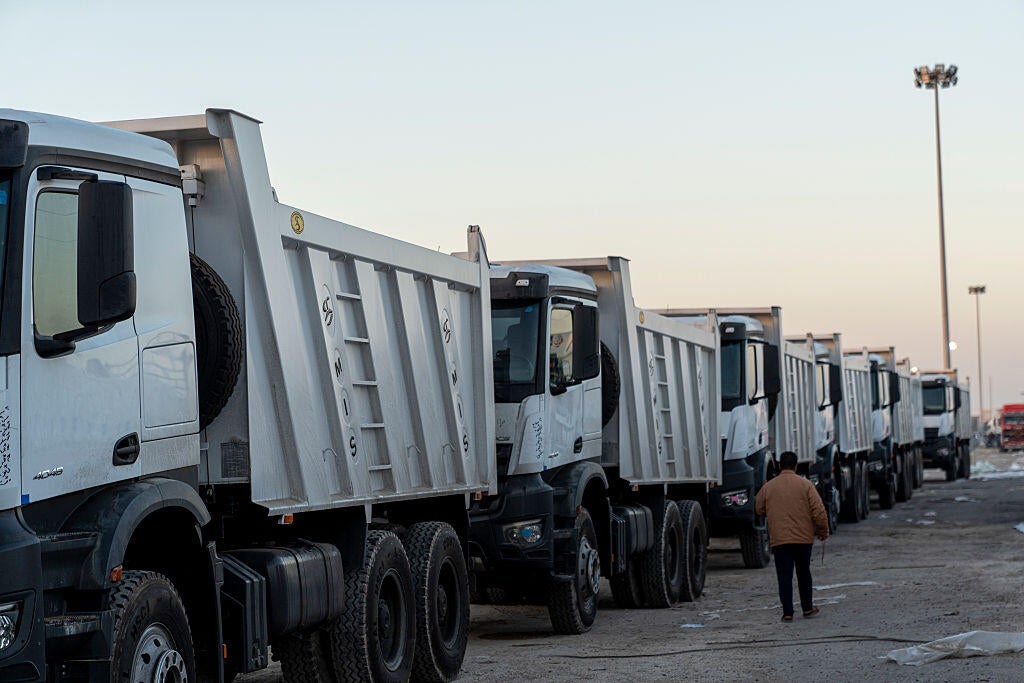Hamas expanded its search for the remaining bodies of Israeli hostages in new areas in the Gaza Strip on Sunday, the U.S.-designated terrorist group said, a day after Egypt deployed a team of experts to help retrieve the bodies. Red Cross personnel accompanied Hamas operatives as they conducted the expanded search operations on Sunday, the international organization confirmed on Monday.
A convoy of trucks and heavy equipment, including an excavator and bulldozers, entered southern Gaza overnight, part of efforts by international mediators to shore up the ceasefire between Hamas and Israel, two Egyptian officials told the Associated Press, who spoke on condition of anonymity because they were not authorized to talk to the media.
The French news agency AFP shared images of the vehicle convoy in Khan Younis, in the south of Gaza.
Trucks line up to enter the Egyptian gate of the Rafah crossing on Oct. 26, 2025 in Rafah, Egypt. / Credit: Ali Moustafa / Getty Images
Under the fragile U.S.-brokered ceasefire, reached on Oct. 10, Hamas is expected to return all of the remains of Israeli hostages as soon as possible. Israel agreed to return 15 bodies of deceased Palestinians for every body of a hostage that is returned.
Thus far, Hamas has returned 18 bodies of hostages, but in the past five days, it has failed to release any remains. Israel has sent back the bodies of 195 Palestinians to Gaza.

The heavy construction machinery to be used in the debris removal operations departs for Gaza to pass through the Rafah Border Crossing, in Egypt, on October 26, 2025. / Credit: Ahmed Sayed/Anadolu/Getty
Hamas’ leader in Gaza, Khalil al-Hayya, said the group had begun searching new areas to find the 13 Israeli hostages’ bodies that remain in the Palestinian territory, according to comments shared by the group early Sunday.
President Trump warned on Saturday that he was “watching very closely” to ensure Hamas returns more bodies within the next 48 hours. “Some of the bodies are hard to reach, but others they can return now and, for some reason, they are not,” he wrote on Truth Social.
Al-Hayya, who is also Hamas’ top negotiator, told an Egyptian media outlet last week that efforts to retrieve the bodies faced challenges because of the massive destruction in Gaza, with some believed to be buried deep under rubble.
Sarah Davies, a spokesperson for the International Committee of the Red Cross, confirmed to CBS News on Monday that Red Cross staff had accompanied “a party to the conflict” as it “searched for the deceased past the IDF-designated ‘yellow line.'”
A Red Cross official confirmed to CBS News separately that the charity’s personnel had accompanied Hamas operatives on Sunday.
Davies stressed the Red Cross’ neutrality, saying the organization “was not involved in the search for the deceased, nor does it take part in the physical recovery of remains. Under international humanitarian law, it is the responsibility of the parties to search for, collect, and retrieve human remains. The parties must endeavor to facilitate the return of the remains of the deceased to their families.”
Israeli strikes wounded four in central Gaza
Israeli forces struck the central Nuseirat refugee camp in Gaza on Saturday night, for the second time in a week, according to Awda Hospital that received the wounded.
The Israeli military claimed it targeted militants associated with the Palestinian Islamic Jihad group who were planning to attack Israeli troops.
Islamic Jihad, the second-largest militant group in Gaza, denied it was preparing for an attack.
Hamas called the strike a “clear violation” of the ceasefire agreement and accused Prime Minister Benjamin Netanyahu of attempting to sabotage Mr. Trump’s efforts to end the war.
It was the same area that Israel targeted in a series of strikes on Oct. 19, after the military accused Hamas militants of killing two Israeli soldiers. That day, Israel launched dozens of deadly strikes across Gaza, killing at least 36 Palestinians, including women and children, according to the strip’s Hamas-run health authorities. It was the most serious challenge to the fragile ceasefire.
Netanyahu defended the military’s actions, saying that Israel will not tolerate attacks against them and will “respond according to our own discretion against attacks.”
“Of course, we also thwart dangers as they are being formed, before they are carried out, as we did just yesterday in the Gaza Strip,” Netanyahu said at the start of his weekly Cabinet meeting Sunday.
Netanyahu also stressed that Israel remained in charge of its own security, after accusations last week that the Trump administration was dictating terms of Israel’s response to security concerns in Gaza. Vice President JD Vance denied any such speculation during his visit.
Dr. Attia on how to make your final decade of life as enjoyable as possible
June Lockhart, beloved for “Lassie,” “Lost in Space,” dies at 100
Gavin Newsom on opposing Donald Trump: “He’s a wrecking ball”

